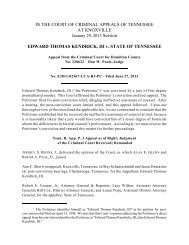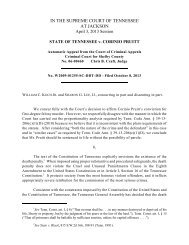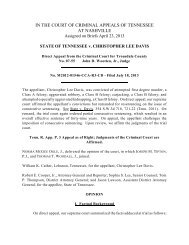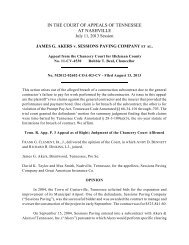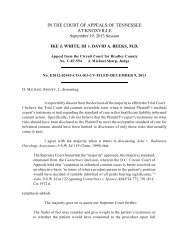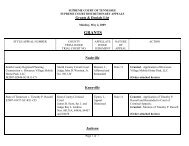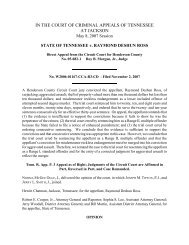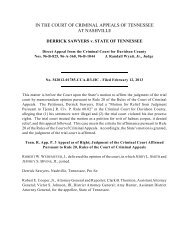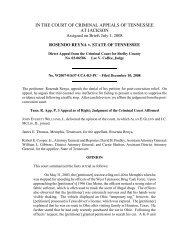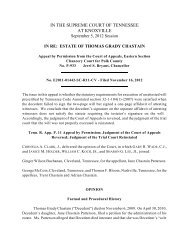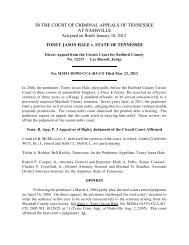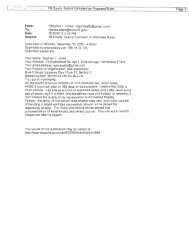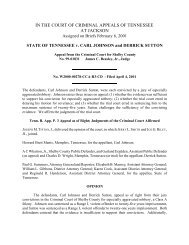Curtis Morris v. Amsouth Bank
Curtis Morris v. Amsouth Bank
Curtis Morris v. Amsouth Bank
Create successful ePaper yourself
Turn your PDF publications into a flip-book with our unique Google optimized e-Paper software.
IN THE COURT OF APPEALS OF TENNESSEE<br />
AT JACKSON<br />
February 20, 2008 Session<br />
CURTIS MORRIS<br />
v.<br />
AMSOUTH BANK<br />
Appeal from the Circuit Court for Shelby County<br />
No. CT-004203-04 Rita L. Stotts, Judge<br />
No. W2007-01688-COA-R3-CV - Filed September 23, 2008<br />
This appeal involves forged endorsements on a check. The appellant had two checking accounts at<br />
the defendant bank. The appellant forged endorsements on a check, deposited the check into his<br />
account at the bank, and then removed the proceeds from his bank account. The bank later<br />
determined that the endorsements on the check were forged and debited the appellant’s other account<br />
in the amount of the fraudulently endorsed check. The appellant filed a lawsuit against the bank, and<br />
the bank counterclaimed for the amount of the check on which the appellant forged the<br />
endorsements. The bank filed a motion for summary judgment and submitted a statement of<br />
undisputed material facts in support of the motion. The appellant did not respond to the bank’s<br />
statement of undisputed material facts. The trial court granted summary judgment in favor of the<br />
bank, and the appellant appeals. We affirm and remand the case to the trial court for determination<br />
of damages against the appellant for a frivolous appeal.<br />
Tenn. R. App. P. 3 Appeal as of Right; Judgment of the Circuit Court is Affirmed;<br />
Remanded for Determination of Damages for Frivolous Appeal<br />
HOLLY M. KIRBY, J., delivered the opinion of the Court, in which, ALAN E. HIGHERS, P.J., W.S.,<br />
joined; W. FRANK CRAWFORD, J., did not participate.<br />
<strong>Curtis</strong> <strong>Morris</strong>, Appellant pro se.<br />
Jeremy G. Alpert, Memphis, Tennessee, for Appellee AmSouth <strong>Bank</strong>.<br />
OPINION<br />
On approximately April 22, 2002, Lienica <strong>Morris</strong> executed a general power of attorney<br />
appointing her brother, Plaintiff/Appellant <strong>Curtis</strong> <strong>Morris</strong> (“<strong>Morris</strong>”) as her attorney-in-fact. On June<br />
7, 2002, Lienica <strong>Morris</strong> executed a second power of attorney, naming her father as her attorney-infact.<br />
On June 26, 2002, Lienica <strong>Morris</strong> revoked the power of attorney previously given to her<br />
brother, <strong>Morris</strong>; this revocation removed <strong>Morris</strong> as her attorney-in-fact for all purposes. There is no
dispute in the record that these powers of attorney, as well as the revocation of the power of attorney<br />
to <strong>Morris</strong>, were properly executed.<br />
On July 2, 2002, Homecomings Financial wrote a check made payable to “Lienica <strong>Morris</strong><br />
and C’s Custom Painting and Remodeling” (“Check”). The amount of the Check was $15,920.00.<br />
<strong>Morris</strong> was not a payee on this Check, and by the time the Check was written, <strong>Morris</strong>’ sister, Lienica<br />
<strong>Morris</strong>, had revoked his power of attorney. Nevertheless, on July 3, 2002, <strong>Morris</strong> deposited the<br />
Check into his business checking account at Defendant/Appellee AmSouth <strong>Bank</strong> (“AmSouth”). The<br />
endorsements on the back of the Check purported to be those of Lienica <strong>Morris</strong> and the owner of C’s<br />
Custom Painting and Remodeling, Calvin Pulliam. There is nothing in the record to indicate that,<br />
at that time, <strong>Morris</strong> had any authority to endorse checks for either Lienica <strong>Morris</strong> or for C’s Custom<br />
Painting and Remodeling.<br />
In August 2002, Calvin Pulliam and Lienica <strong>Morris</strong> executed affidavits stating that the<br />
endorsements of their names on the Check were forged. This prompted an internal investigation by<br />
AmSouth <strong>Bank</strong>, which ultimately determined that <strong>Morris</strong> forged the endorsements on the back of<br />
the Check. Consequently, AmSouth debited <strong>Morris</strong>’ business checking account for the amount of<br />
the check, $15,920.00, and returned the funds to Homecomings Financial.<br />
In addition to his business checking account, <strong>Morris</strong> also maintained a personal checking<br />
account at AmSouth. It is undisputed that both the business account and the personal account are<br />
governed by a Customer Agreement for Depository Accounts (“Deposit Agreement”). As of June<br />
16, 2006, <strong>Morris</strong> was overdrawn on his personal checking account in the amount of $270.15, and<br />
on his business checking account in the amount of $16,093.22, for a total overdraft of $16,363.37.<br />
In January 2004, <strong>Morris</strong> filed a civil warrant in the Shelby County General Sessions Court<br />
against AmSouth. In July 2004, judgment was entered in favor of AmSouth, and <strong>Morris</strong> appealed<br />
to the Shelby County Circuit Court. <strong>Morris</strong>’ appeal apparently remained pending in the Circuit<br />
Court.<br />
In February 2006, AmSouth filed a counter-complaint in Circuit Court against <strong>Morris</strong>,<br />
asserting breach of contract, unjust enrichment, restitution, indemnity, and conversion. Apparently,<br />
<strong>Morris</strong> did not file a response to AmSouth’s counter-complaint. In June 2006, AmSouth filed a<br />
motion for summary judgment on <strong>Morris</strong>’ claims against AmSouth. AmSouth also filed a motion<br />
for default judgment or, in the alternative, for summary judgment, on AmSouth’s counter-complaint<br />
against <strong>Morris</strong>. In October 2006, the trial court granted AmSouth’s motion for summary judgment<br />
as to <strong>Morris</strong>’ claims against AmSouth, granted AmSouth’s motion for default judgment on<br />
AmSouth’s counter-complaint, and entered final judgment against <strong>Morris</strong>.<br />
In November 2006, <strong>Morris</strong> filed a motion with the trial court seeking relief from the order<br />
granting AmSouth’s motions. The trial court held a hearing on <strong>Morris</strong>’ request for relief, and entered<br />
an order on March 21, 2007. In the order, the trial court denied <strong>Morris</strong> relief as to the entry of<br />
summary judgment on his claims against AmSouth, but granted <strong>Morris</strong>’ request for relief from the<br />
-2
default judgment on AmSouth’s counter-complaint. However, because AmSouth’s original motion<br />
also included an alternate motion for summary judgment on AmSouth’s counter-complaint, the<br />
summary judgment motion was set for hearing. Following that hearing, on March 27, 2007, the trial<br />
court entered an order granting AmSouth’s motion for summary judgment on AmSouth’s countercomplaint<br />
and entering final judgment in the action against <strong>Morris</strong>, awarding compensatory damages<br />
of $16,363.37 and attorney’s fees of $5,454.45, for a total award of $21,817.82. On April 20, 2007,<br />
<strong>Morris</strong> filed a motion to alter or amend the judgment, which was denied.<br />
<strong>Morris</strong> now appeals. On appeal, he argues that the trial court erred in granting AmSouth’s<br />
motion for summary judgment as to <strong>Morris</strong>’ claims against AmSouth, and in granting AmSouth’s<br />
motion for summary judgment as to AmSouth’s counter-complaint against <strong>Morris</strong>.<br />
We are cognizant of the fact that <strong>Morris</strong> is proceeding pro se. While a party who chooses to<br />
represent himself or herself is entitled to the fair and equal treatment of the courts, Hodges v. Tenn.<br />
Att’y Gen., 43 S.W.3d 918, 920 (Tenn. Ct. App.2000) (citing Paehler v. Union Planters Nat’l<br />
<strong>Bank</strong>, Inc., 971 S.W.2d 393, 396 (Tenn. Ct. App.1997)), “[p]ro se litigants are not ... entitled to shift<br />
the burden of litigating their case to the courts.” Whitaker v. Whirlpool Corp., 32 S.W.3d 222, 227<br />
(Tenn. Ct. App.2000) (citing Dozier v. Ford Motor Co., 702 F.2d 1189, 1194-95 (D.C. Cir.1983)).<br />
Pro se litigants must comply with the same substantive and procedural law to which parties<br />
represented by counsel must adhere. Hodges, 43 S.W.3d at 920-21. In the instant appeal, AmSouth<br />
points out that, in his appellate brief, <strong>Morris</strong> failed to cite to the record as required under Rule<br />
27(a)(7) of the Tennessee Rules of Appellate Procedure. Despite <strong>Morris</strong>’ failure to comply with the<br />
briefing requirements, given the fact that the record is minimal and in the interest of judicial<br />
economy and adjudicating the case on its merits, we will nonetheless address the issues raised.<br />
Turning to those issues, we first note that a motion for summary judgment should be granted<br />
when the movant demonstrates that there are no genuine issues of material fact and that the moving<br />
party is entitled to a judgment as a matter of law. See Tenn. R. Civ. P. 56.04. The party moving for<br />
summary judgment bears the burden of demonstrating that no genuine issue of material fact exists.<br />
See Bain v. Wells, 936 S.W.2d 618, 622 (Tenn.1997). On a motion for summary judgment, the court<br />
must take the strongest legitimate view of evidence in favor of the nonmoving party, allow all<br />
reasonable inferences in favor of that party, and discard all countervailing evidence. See id. In Byrd<br />
v. Hall, 847 S.W.2d 208 (Tenn.1993), our Supreme Court stated:<br />
Once it is shown by the moving party that there is no genuine issue<br />
of material fact, the nonmoving party must then demonstrate, by<br />
affidavits or discovery material, that there is a genuine, material fact<br />
dispute to warrant a trial. In this regard, Rule 56.05 provides that the<br />
nonmoving party cannot simply rely upon his pleadings but must set<br />
forth specific facts showing that there is a genuine issue of material<br />
fact for trial.<br />
Id. at 210-11 (citations omitted).<br />
-3
Under Byrd v. Hall, if the movant does successfully negate a claimed basis for the suit, the<br />
non-movant may no longer simply rely upon the pleadings. Id. The non-moving party must then<br />
establish the existence of the essential elements of the claim. Id. The burden of the non-moving party<br />
may be met by:<br />
Id. at 215 n. 6.<br />
(1) pointing to evidence establishing material factual disputes that<br />
were over-looked or ignored by the moving party;<br />
(2) rehabilitating the evidence attacked by the moving party;<br />
(3) producing additional evidence establishing the existence of a<br />
genuine issue for trial; or<br />
(4) submitting an affidavit explaining the necessity for further<br />
discovery pursuant to Tenn. R. Civ. P., Rule 56.06.<br />
Summary judgment is only appropriate when the facts and the legal conclusions drawn from<br />
the facts reasonably permit only one conclusion. See Carvell v. Bottoms, 900 S.W.2d 23, 26<br />
(Tenn.1995). Because only questions of law are involved, there is no presumption of correctness<br />
regarding a trial court’s ruling on a motion for summary judgment. See Bain, 926 S.W.2d at 622.<br />
Therefore, our review of the trial court’s grant of summary judgment is de novo on the record before<br />
this Court. See Warren v. Estate of Kirk, 954 S.W.2d 722, 723 (Tenn.1997).<br />
The appellate record includes no response by <strong>Morris</strong> to AmSouth’s statement of undisputed<br />
material facts, which was filed in conjunction with its motion for summary judgment. Rules 56.03<br />
and 56.04 of the Tennessee Rules of Civil Procedure require any party opposing a motion for<br />
1<br />
summary judgment to respond to each fact set forth by the movant. Because <strong>Morris</strong> failed to<br />
1<br />
Rule 56.03 states:<br />
Specifying Material Facts.<br />
In order to assist the Court in ascertaining whether there are any material facts in dispute,<br />
any motion for summary judgment made pursuant to Rule 56 of the Tennessee Rules of Civil<br />
Procedure shall be accompanied by a separate concise statement of the material facts as to which<br />
the moving party contends there is no genuine issue for trial. Each fact shall be supported by a<br />
specific citation to the record.<br />
Any party opposing the motion for summary judgment must, not later than five days<br />
before the hearing, serve and file a response to each fact set forth by the movant either (i) agreeing<br />
that the fact is undisputed, (ii) agreeing that the fact is undisputed for purposes of ruling on the<br />
motion for summary judgment only, or (iii) demonstrating that the fact is disputed. Each disputed<br />
fact must be supported by specific citation to the record. Such response shall be filed with the<br />
papers in opposition to the motion for summary judgment.<br />
Tenn. R. Civ. P. 56.03 (2007). Rule 56.04 states:<br />
-4-
comply with this requirement, the trial court was entitled to assume that the facts set forth by<br />
AmSouth are correct and undisputed. This Court likewise finds, based on the record, that there are<br />
no disputed material facts in this case. 2<br />
From the appellate record before us, the undisputed facts are as follows. As of July 2, 2002,<br />
the day <strong>Morris</strong> deposited the Check, Lienica <strong>Morris</strong> had revoked the power of attorney that she had<br />
previously executed in favor of <strong>Morris</strong>. Furthermore, <strong>Morris</strong> had no authority to sign for C’s Custom<br />
Painting. Both Lienica <strong>Morris</strong> and Calvin Pulliam executed affidavits of forged endorsement<br />
regarding the Check.<br />
Moreover, both of <strong>Morris</strong>’ checking accounts at AmSouth are governed by the Deposit<br />
Agreement, which is part of this record. The Deposit Agreement clearly states that AmSouth is<br />
entitled to disgorge the proceeds of the Check from <strong>Morris</strong>’ account under the facts of this case:<br />
Subject to the moving party’s compliance with Rule 56.03, the judgment sought shall be rendered<br />
forthwith if the pleadings, depositions, answers to interrogatories, and admissions on file, together<br />
with the affidavits, if any, show that there is no genuine issue as to any material fact and that the<br />
moving party is entitled to a judgment as a matter of law.<br />
Tenn. R. Civ. P. 56.04 (2007).<br />
If anyone claims that a check deposited to your account or cashed by<br />
us for you bears an unauthorized, forged or improper endorsement,<br />
has been altered, or is not properly payable for any other reason, we<br />
[i.e. AmSouth] may charge the check to your account or to any<br />
account which you own individually or jointly with others. For<br />
accounts established in Tennessee, we may charge the check to any<br />
account which you own individually or jointly with others that may<br />
be accessed without further consent of any joint depositor(s). If we<br />
are notified that any check cashed for you or deposited to your<br />
account for collection is not properly payable, you agree that, without<br />
further notice to you, we may authorize the drawee bank to hold the<br />
check and try to obtain payment.<br />
Moreover, the Tennessee Uniform Commercial Code grants AmSouth a statutory right to disgorge<br />
funds that have been obtained through mistake or fraud:<br />
(a) Except as provided in subsection (c), if the drawee of a draft pays or accepts the<br />
draft and the drawee acted on the mistaken belief that (i) payment of the draft had<br />
not been stopped pursuant to § 47-4-403 or (ii) the signature of the drawer of the<br />
2<br />
In his appellate brief, <strong>Morris</strong> sets out numerous facts and proceedings that are not included in the appellate<br />
record before this Court. We are constrained to consider only facts and proceedings supported by the record before<br />
us. See, e.g., Baldwin v. State, 325 S.W.2d 244 (Tenn. 1959).<br />
-5
draft was authorized, the drawee may recover the amount of the draft from the<br />
person to whom or for whose benefit payment was made or, in the case of<br />
acceptance, may revoke the acceptance. Rights of the drawee under this subsection<br />
are not affected by failure of the drawee to exercise ordinary care in paying or<br />
accepting the draft.<br />
Tenn. Code Ann. § 47-3-418 (2001) (emphasis added).<br />
From the undisputed facts in the record, as set out above, <strong>Morris</strong> had no authority to endorse<br />
the Check. Because <strong>Morris</strong> had no legal rights to these funds, AmSouth had both a contractual right<br />
under the Deposit Agreement and a statutory right under the Tennessee Uniform Commercial Code<br />
to disgorge the proceeds of the Check from <strong>Morris</strong>’ accounts. However, the record shows that<br />
<strong>Morris</strong> withdrew the proceeds of the Check from his account before AmSouth had performed its due<br />
diligence and exercised its rights to disgorge them. Because <strong>Morris</strong> was never entitled to these<br />
funds, he is responsible for repaying them to AmSouth. Consequently, the trial court did not err in<br />
dismissing <strong>Morris</strong>’ claims and granting summary judgment in favor of AmSouth on its countercomplaint.<br />
On appeal, AmSouth has asked for its costs and fees associated with this appeal on the<br />
grounds that <strong>Morris</strong>’ appeal of the trial court’s judgment is frivolous. An appeal may be deemed<br />
frivolous if it is devoid of merit or if it has no reasonable chance of success. Williams v. Williams,<br />
No. W2007-00109-COA-R3-CV, 2008 WL 2901578 at *6 (Tenn. Ct. App. July 28, 2008).<br />
Tennessee Code Annotated § 27-1-122 outlines the damages the appellate court may award against<br />
a party who brings a frivolous appeal:<br />
When it appears to any reviewing court that the appeal from any court of record was<br />
frivolous or taken solely for delay, the court may, either upon motion of a party or of<br />
its own motion, award just damages against the appellant, which may include, but<br />
need not be limited to, costs, interest on the judgment, and expenses incurred by the<br />
appellee as a result of the appeal.<br />
Tenn. Code Ann. § 27-1-222 (2000).<br />
From our review of the record in this case, we must conclude that <strong>Morris</strong> had no reasonable<br />
chance of success in this appeal. At the trial level, he did not contest AmSouth’s statement of<br />
undisputed material facts. Absent any disputed material facts, AmSouth’s entitlement to the<br />
proceeds of the Check is clear under both the Deposit Agreement and the UCC. “Successful<br />
litigants should not have to bear the expense and vexation of groundless appeals.” Davis v. Gulf Ins.<br />
Group, 546 S.W.2d 508, 586 (Tenn. 1977). Accordingly, we find that this is a frivolous appeal, and<br />
that AmSouth is entitled to its costs and fees incurred as a result of the appeal. We remand the cause<br />
to the trial court for a determination by the trial court of damages to be assessed against <strong>Morris</strong> for<br />
this frivolous appeal.<br />
-6
The decision of the trial court is affirmed and the cause is remanded for further proceedings<br />
consistent with this Opinion. Costs of the appeal are assessed against the Appellant <strong>Curtis</strong> <strong>Morris</strong>,<br />
and his surety, for which execution may issue if necessary.<br />
__________________________________________<br />
HOLLY M. KIRBY, JUDGE<br />
-7-



